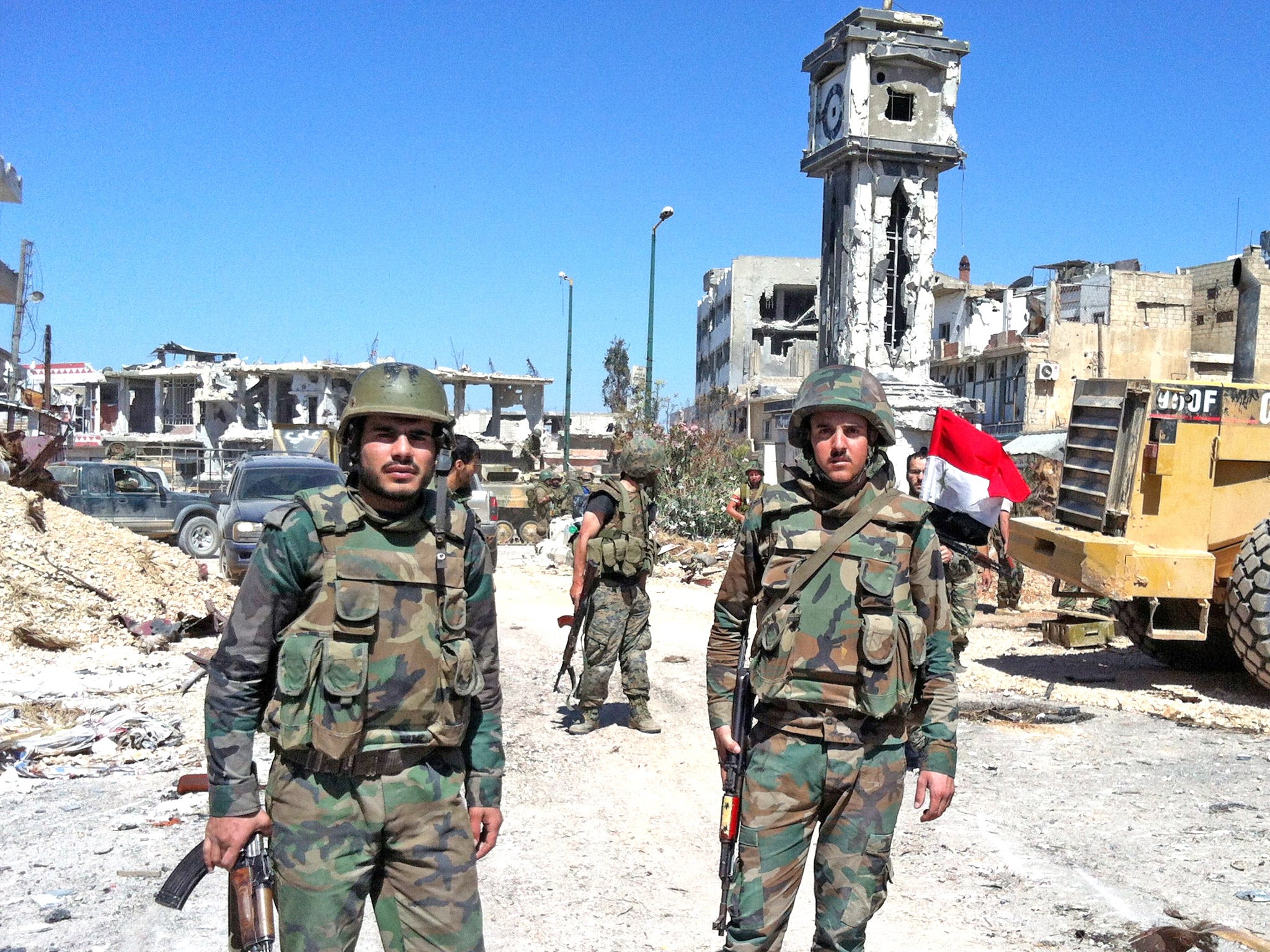Syria: President Assad’s forces plan to re-take Aleppo with Hezbollah after capturing border town of Qusayr
Rebels lose strategic town of Qusayr after three weeks of bitter fighting

Your support helps us to tell the story
From reproductive rights to climate change to Big Tech, The Independent is on the ground when the story is developing. Whether it's investigating the financials of Elon Musk's pro-Trump PAC or producing our latest documentary, 'The A Word', which shines a light on the American women fighting for reproductive rights, we know how important it is to parse out the facts from the messaging.
At such a critical moment in US history, we need reporters on the ground. Your donation allows us to keep sending journalists to speak to both sides of the story.
The Independent is trusted by Americans across the entire political spectrum. And unlike many other quality news outlets, we choose not to lock Americans out of our reporting and analysis with paywalls. We believe quality journalism should be available to everyone, paid for by those who can afford it.
Your support makes all the difference.The forces of Bashar al-Assad are thought to be preparing an assault on Syria’s biggest city after capturing the strategically important town of Qusayr with large-scale backing from Lebanon’s Hezbollah.
The rebels’ loss of the town – which holds symbolic value to both sides in the country’s vicious civil war – after three weeks of bitter fighting comes amid reports that the regime is readying an attempt to re-take Aleppo.
Such an attack could come with further help from Hezbollah; some commanders of the Shia militia claim they are ready to take thousands of men across the border.
The opposition holds about half of the northern city, and a battle to retake it is likely to be bloody with the opposition aware that failure to hang on to their positions would be a setback.
Large swathes of territory remain outside the control of the regime two and half years since the start of the uprising. But recent gains being made on the ground have put President Assad in a stronger position before peace talks in a bid to end the conflict which has claimed 80,000 lives so far. UN international envoy for Syria, Lakhdar Brahimi, said the delayed talks may happen in July. American and Russian officials held a preliminary meeting in Geneva, the venue for the projected talks. The Syrian National Council (SNC), an umbrella group of the opposition, maintains that no ceasefire is possible while President Assad stays in power and Hezbollah participates in the fighting.
The expectation among diplomats remains that the SNC will be persuaded to attend the talks by its backers in the Arab League and the West. There is deep apprehension that the talks failing, or not taking place, would accelerate the spread of strife from Syria into neighbouring countries.
Residents in the predominantly Shia suburb of Dahiyah in Beirut celebrated after news broke of the fall of Qusayr. The movement’s leader, Hassan Nasrallah, has given unequivocal backing to the Assad regime, and its involvement in Syria is likely to increase rather if fighting continues.
Furthermore, the entry of the Shia militia will further demarcate the war along sectarian lines between the Alawites, a Shia offshoot from which President Assad and the ruling elite are drawn and the mainly Sunni opposition.
Anxiety to keep the Geneva talks on track is seen as one of the reasons why the Americans are urging caution after the latest claim, by France and Britain, that the regime has been using sarin gas. Officials in Washington stated that stronger evidence would be needed to prove that President Assad had crossed the “red line” on chemical weapons set down by Barack Obama.
Meanwhile, humanitarian organisations called for help for victims of conventional weapons in Qusayr. Doctors said there was little or no medicine left for the severely injured who could not leave when much of the population fled the fighting. The International Committee of the Red Cross (ICRC) said it hoped to gain access. “There are reports of hundreds of people that have been wounded,” spokeswoman Rima Kamal told the BBC.
Qusayr, which had a population of 30,000 before the attack, was of great value to the opposing sides. Its capture means the regime holds a land corridor to the Mediterranean coast where the Alawite community is mainly based. Before the recent gains, there had been speculation President Assad would retreat there if Damascus fell.
The rebels have now lost their supply line to the Lebanese border just six miles away, and Sunni villages in the area are more vulnerable to the actions of the regime and Hezbollah.
Although most of the rebel fighters in Qusayr had been locals, volunteers from other parts of the country came to defend the town. Among them were several hundred from Jabhat al-Nusra, a hardline Islamist group prescribed as a terrorist organisation by the US.
General Salim Idriss, the head of the opposition’s Free Syria Army, had accused the Lebanese government of doing nothing while Hezbollah “invaded” Syria. “There are now a very large number of Hezbollah fighters in Syria,” he declared, saying this entitled the rebels to carry out attacks on the Shia militia inside Lebanon.
Abu Qassem, a rebel commander in Idlib province, said his forces were preparing to face an onslaught. “Bashar’s troops are getting a lot of arms from Iran and Russia, especially long-range rockets, and they are having an effect. We also know that Hezbollah have a lot more of their fighters inside Syria than they used to. They will try to come this way and they will try to terrorise people, so we must be ready.”
Join our commenting forum
Join thought-provoking conversations, follow other Independent readers and see their replies
Comments